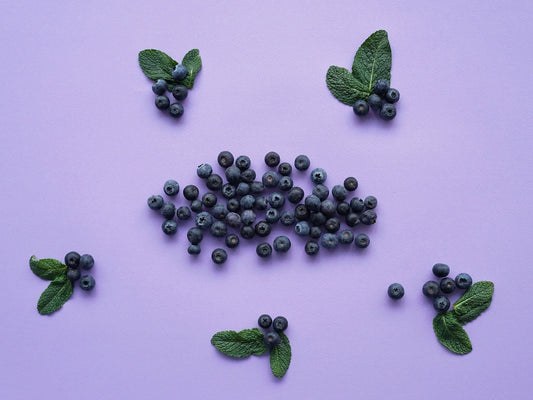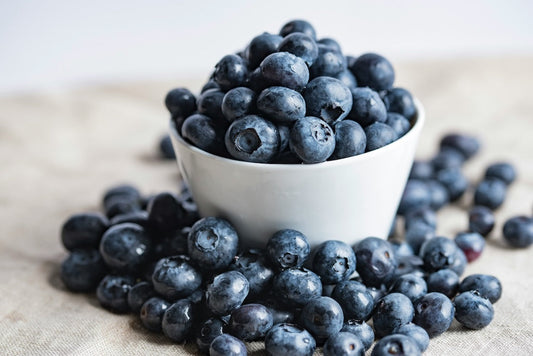Cocoa is known in many different forms, such as the basic ingredient for chocolate or hot drinks. But how healthy is cocoa really and is it as bad as its reputation sometimes makes it seem? Cocoa is one of the most mineral-rich foods on this planet and has been with us for thousands of years. However, its true meaning extends far beyond what our senses can perceive. Let's dive into the enticing world of cocoa and learn more about the different types of cocoa and their many benefits.
Discover your organic breakfast with cocoa
Where does cocoa come from?
Cocoa is obtained from the seeds of the cocoa tree, which is native to the tropical regions of Central and South America. Cocoa was a staple food and cultural symbol in these areas. The history of cocoa goes back thousands of years, which is why the ways it is produced and used have developed and changed worldwide. Nowadays, cocoa is grown in many tropical regions of the world. The largest producers include Ivory Coast, Ghana, Indonesia and Nigeria.
Conventional cocoa cultivation vs. organic and fair trade cultivation
It is no secret that cultivating cocoa in particular has a bad reputation due to the sometimes devastating working conditions. For this reason, you should definitely make sure that the cocoa you consume has an organic or fair trade certification. When cocoa is grown with organic certification, environmentally friendly and socially responsible farming methods are used. Cocoa from fair trade cultivation adheres to even higher social and ecological standards. In particular, care is taken to ensure that the farmers and workers are fairly compensated for their work. The labels ensure that the working conditions and production are fair and that no child labor is used.
Cocoa has so many healthy properties
Cocoa is a rich source of flavonoids, particularly flavanols, which have remarkable antioxidant effects. These plant compounds act as guardians, protecting the body from oxidative stress and the harmful effects of free radicals. The richness in antioxidants is crucial for promoting health and has far-reaching effects on various body systems. But cocoa has even more healthy properties. We will show you the most important ones here:
Cocoa is full of antioxidants
Pure unsweetened cocoa is rich in antioxidants. These neutralize harmful free radicals in the body. In addition, cocoa can help prevent cell damage, which in turn reduces the risk of heart disease and certain types of cancer.
The importance of flavanols
Flavanols are the jewels of cocoa that give it its antioxidant power. They help the body fight cell damage by neutralizing free radicals. This helps to maintain cell health and plays an important role in preventing diseases, especially cardiovascular diseases.
The flavonoids in cocoa also help to lower your blood pressure while improving your blood flow. They also support cognitive performance, which has a positive effect on our attention and memory. In addition to antioxidants and flavonoids, cocoa also contains important minerals such as iron, magnesium and potassium.
Cardiovascular health and antioxidants
Antioxidant properties are essential for heart health. Flavanols help to dilate blood vessels, regulate blood pressure and improve blood flow. This combination supports cardiovascular health and may reduce the risk of heart attack and stroke.
Cocoa as a source of comprehensive protection
The abundance of antioxidants offers holistic protection for the body. The neutralization of free radicals helps to protect cells from damage and supports the immune system. This protective mechanism can contribute to the prevention of various diseases and contributes to overall health.
The antioxidant power of cocoa makes it a valuable ingredient in a balanced diet. By supplying the body with antioxidants, cocoa helps to promote good health and prevent disease. It is important to choose high-quality cocoa sources to benefit from its full antioxidant potency and support your health in a natural way.
Cocoa as a mood booster
Did you know that cocoa also contains substances such as serotonin and phenylethylamine, which you are probably familiar with as “happy hormones”? Happiness hormones are mood enhancers that lift our spirits and thus promote our general well-being.
Cocoa and heart health
The flavanols in cocoa can help improve heart health by dilating blood vessels and lowering blood pressure. This supports blood flow and promotes heart health. Studies suggest that regular consumption of high-quality cocoa could reduce the risk of heart attacks and strokes.
Cocoa and mental health
The effects of cocoa on mental health are also promising. Certain compounds in cocoa may improve mood and reduce stress. Serotonin and dopamine, which are released when cocoa is consumed, help to increase well-being and may even protect against depression.
The power of cocoa to reduce inflammation
Cocoa is not only a feast for the senses, but also offers potential protection against inflammation in the body. The flavanols and other bioactive compounds it contains show promising anti-inflammatory properties that could have far-reaching health benefits.
Flavanols as guardians against inflammation
Flavanols, which are abundant in cocoa, play a key role in reducing inflammation in the body. They can reduce the production of pro-inflammatory molecules, thus helping to mitigate the extent and severity of inflammation. This protective mechanism is important because chronic inflammation is associated with various health issues.
The role of inflammation in the body
Inflammation is part of the body's defense mechanisms, occurring in response to infection or injury. However, chronic inflammation, which persists over a longer period of time, can increase the risk of various diseases, including cardiovascular disease, diabetes and certain cancers. The ability of cocoa to reduce inflammation can thus make a valuable contribution to the prevention of these diseases.
Cocoa as a natural anti-inflammatory
The bioactive compounds in cocoa, especially the flavanols, act as natural anti-inflammatories. They can mitigate pro-inflammatory processes in the body and thus reduce the risk of chronic diseases. Regular consumption of high-quality cocoa could therefore play a supportive role in controlling inflammation and its potential negative effects.
Cocoa's natural anti-inflammatory properties are one of the fascinating aspects of this superfood. Its ability to reduce inflammation can make an important contribution to health. By choosing high-quality cocoa sources, the anti-inflammatory properties can be put to best use to promote health and enhance well-being.
Cocoa and digestive health
Dietary fiber is a crucial component in promoting healthy digestion. It supports intestinal health, regulates intestinal motility and promotes healthy intestinal flora. As a result, cocoa can help prevent digestive issues and reduce the risk of intestinal diseases.
Choice of cocoa form and its effects
Raw cocoa, which is less processed, retains more of its natural nutrients compared to highly processed cocoa forms. Choosing high-quality dark chocolate with a higher cocoa content could therefore offer more health benefits than highly processed chocolate products, which are often enriched with sugar and additives.
The importance of a moderate cocoa intake
Despite the numerous health benefits, it is important to consume cocoa in moderation. Excessive consumption can lead to an excessive intake of caffeine and cause sleep disturbances or restlessness in some individuals. The sugar content of some commercial cocoa products should also be taken into account, as excessive consumption of sugar can have negative health effects.
How healthy is cocoa powder?
There are different types of cocoa powder, which differ mainly in their fat content and thus in taste and texture.
- Deoiled cocoa powder is characterized by a very low fat content, as most of the cocoa butter has been removed during the manufacturing process.
- Partially defatted cocoa powder has a medium fat content with more cocoa butter and is often referred to as “semi-skimmed cocoa powder”.
- Non-defatted cocoa powder has the highest fat content because most of the cocoa butter from the cocoa beans is retained.
The sugar and fat content in cocoa
You should definitely make sure that the sugar and fat content of your cocoa powder is not too high. Classic non-deoiled cocoa powder is high in unhealthy saturated fat, which can lead to health problems and weight gain if consumed in large quantities. If you have a high-quality, pure and unsweetened cocoa powder, i.e. one with a high cocoa content, you will also reap the benefits. The reason for this is that this high-quality cocoa powder contains more health-promoting flavonoids.
Baking cocoa vs. pure cocoa – what is the difference?
As the name suggests, baking cocoa is generally used for baking and desserts. The reason for this is that in most cases, the powder has been processed with milk powder and sugar to achieve a sweeter and creamier taste. In direct comparison, pure cocoa, without added sugar, tastes more intense, which many therefore also find rather bitter.
Both baking cocoa and pure cocoa powder are used in a wide variety of recipes. However, many people prefer the less healthy, sweetened version of (baking) cocoa for purposes such as hot chocolate, cookies, or brownies. By comparison, the tart flavor of pure cocoa powder makes it a popular addition to a wide variety of dishes as an additional spice. In Mexico, in particular, combining chili, cinnamon, cumin and other aromatic ingredients with cocoa powder is very popular. According to Mexicans, this gives the dishes a rich depth and special flavor that they don't want to do without in their cuisine.
Various cocoa products – from healthy breakfast toppings to skin care
Not only cocoa powder is particularly popular, but also cocoa nibs have been gaining in popularity for some time. These are small pieces of cocoa beans that have a slightly tart but definitely chocolaty flavor. Cocoa nibs are another way to enjoy cocoa as a healthy snack. They are also perfect as a healthy topping for your yogurt or your favorite baked goods. You see, cocoa can be processed into a wide variety of cocoa products and is very popular in its many different forms.
However, cocoa not only scores points when combined with other foods, but is also often used as a skin care product. In cosmetics, it is frequently used in the form of cocoa butter. Due to its high fat content, cosmeticians recommend cocoa butter-based products to people with dry skin and chapped lips in particular. The high mineral, antioxidant and vitamin content is said to strengthen cells and moisturize our skin.
Cocoa contains a lot of caffeine
Cocoa has a slight caffeine content. Not as much as coffee, but enough to wake you up. For this reason, you should pay attention to the time of day when consuming cocoa, for example to avoid sleep problems and the associated side effects. Experts therefore advise that cocoa should generally be enjoyed in moderation and that you should also pay attention to your individual needs and preferences.
Healthy recipes with cocoa
There are now countless recipes for delicious snacks, breakfast options and desserts that you can make with cocoa. Our three favorite recipes, which are quick and easy to prepare, are as follows:
Cocoa porridge without sugar
Preparation time: 10 minutes
Course: breakfast
Ingredients:
- 50 g Verival Protein Porridge raspberry cocoa
- 250 ml plant-based drink or water for infusing
- 1 pinch of salt
- Optional: toppings
- Verival cocoa-sour cherry granola for sprinkling
- cocoa nibs
- nuts or seeds
- fresh fruit
Preparation
- Put porridge with warm milk or hot water and a pinch of salt in a saucepan and cook for about 3 minutes.
- Remove the porridge from the heat and let it steep for another 2-3 minutes.
- Pour the porridge into a bowl and sprinkle with the Verival cocoa-sour cherry granola for added crunch and flavor.
- Top with cocoa nibs, nuts or fruit as you like.
- Enjoy your healthy breakfast without any added sugar.
Try delicious porridge with cocoa.
Conclusion
Cocoa is undoubtedly a remarkable food with a wide range of potential health benefits. Its antioxidant properties, positive effects on the cardiovascular system, mental health and anti-inflammatory properties make it an interesting addition to the diet.
Consciously choosing high-quality cacao products and consuming them in moderation can help you reap the health benefits of this amazing superfood. Enjoy cacao as part of a balanced diet and discover the variety of health benefits in a pleasant way. Remember that the right dosage makes the difference between a healthy treat and excessive consumption.
Cocoa comes in many different forms and processing types. These vary in their health benefits, which is why you should always pay attention to the ingredients. In addition, it is very important to look for organic and fair trade certifications to support fair working conditions in the countries of origin.
Frequently asked questions
Why is cocoa healthy?
Cocoa contains antioxidants, especially flavonoids, which can offer you health benefits. However, you need to make sure that it is a pure and, above all, unsweetened cocoa.
Can cocoa improve mood swings?
Cocoa can improve your mood by releasing endorphins and serotonin. However, this is only a temporary effect.
Is baking cocoa healthier than pure cocoa powder?
In most cases, baking cocoa contains a lot of sugar, which explains the sweeter taste compared to pure cocoa powder. For this reason, it is less healthy than pure cocoa powder.
Should you consume cocoa in large quantities?
Experts recommend enjoying cocoa in moderation as part of a balanced diet. Above all, however, they advise against regular consumption of any type of sugar-containing cocoa powder in order to avoid unwanted weight gain and other health issues.
Can people with lactose intolerance enjoy cocoa?
In principle, cocoa can be enjoyed even with lactose intolerance. You just need to choose any milk alternative for preparation and pay attention to the additives in processed cocoa products.
Is natural cocoa really that bitter?
Yes, natural cocoa can be very bitter because it contains no additives such as sugar or milk. Its flavor is strong and can vary depending on the variety.
How is chocolate made from cocoa beans?
Cocoa beans are fermented, dried, roasted and then ground to produce cocoa mass, which serves as the basis for chocolate.
How does cocoa cultivation affect the environment?
Fair trade cocoa is important to ensure fair working conditions and decent wages for cocoa farmers, to help fight poverty and exploitation.
What is the difference between raw cocoa and commercial chocolate?
Raw cocoa is less processed and contains more nutrients than commercial chocolate. Cocoa farming can impact the environment through deforestation and pesticide use.
How do you prepare cocoa properly?
To prepare cocoa, you can mix cocoa powder with hot milk or water and add sugar or spices as you like. There are many variations, but the basis is the mixture of cocoa powder and liquid.
























